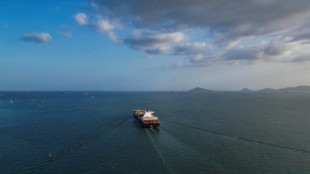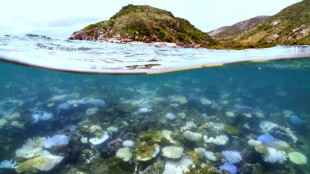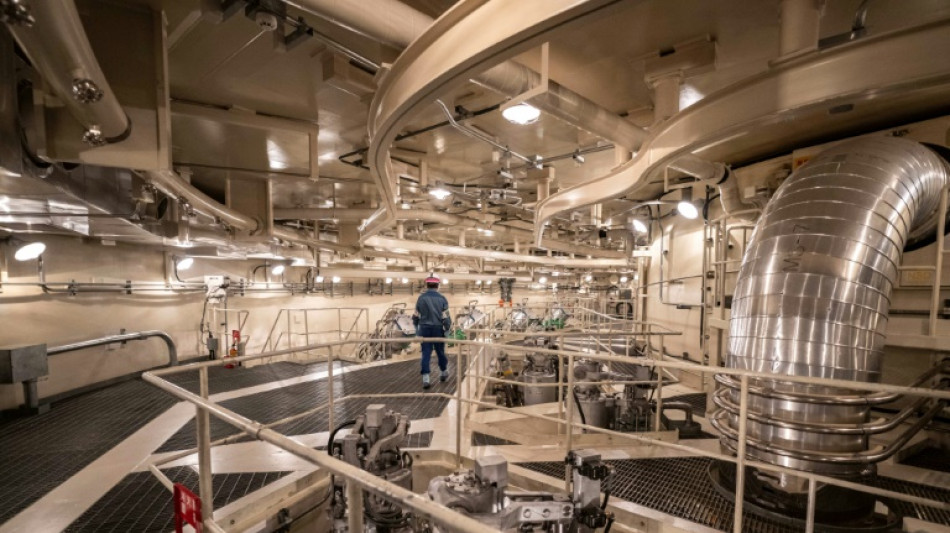
-
 The scientist rewriting DNA, and the future of medicine
The scientist rewriting DNA, and the future of medicine
-
'Anxious': US farmers see tariffs threaten earnings
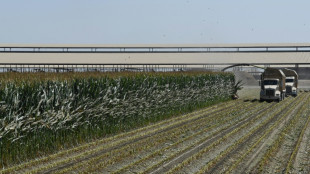
-
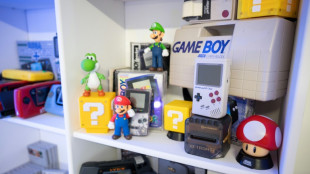 Nostalgia fuels UK boom in vintage video game repairs
Nostalgia fuels UK boom in vintage video game repairs
-
Snappy birthday: Germany's Leica camera turns 100

-
 Bucks clinch playoff berth as West battle tightens
Bucks clinch playoff berth as West battle tightens
-
Czech beer culture eyes UNESCO listing as pubs take hit

-
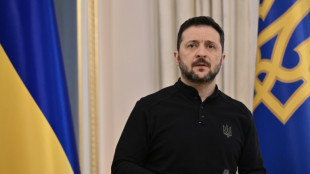 Explosions as Kyiv under missile attack, says mayor
Explosions as Kyiv under missile attack, says mayor
-
Weary Boutier still alive in LPGA Match Play after 45-hole day

-
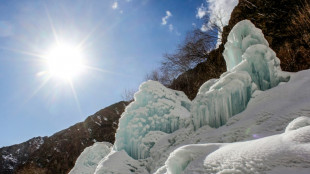 Artificial glaciers boost water supply in northern Pakistan
Artificial glaciers boost water supply in northern Pakistan
-
Brooksby upsets Paul to reach Houston final

-
 Thomas, Bednarek hit jackpot at Grand Slam Track meet
Thomas, Bednarek hit jackpot at Grand Slam Track meet
-
Rodman on target as USA beat Brazil in Olympic rematch

-
 'Hands Off!' Anti-Trump Americans flood Washington
'Hands Off!' Anti-Trump Americans flood Washington
-
Harman leads by three at Texas Open

-
 Barcelona draw to increase Liga lead after Real Madrid stumble
Barcelona draw to increase Liga lead after Real Madrid stumble
-
Ecuador mounts anti-drug op overseen by Blackwater founder
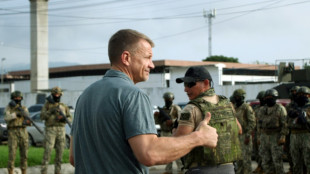
-
 Pegula rallies to reach Charleston final
Pegula rallies to reach Charleston final
-
Nick Rockett flies to victory in magical Mullins Grand National

-
 Ovechkin on the brink of the 'impossible'
Ovechkin on the brink of the 'impossible'
-
Anthony, Bird to enter basketball Hall of Fame

-
 'Phenomenal' Munster edge O'Gara's La Rochelle to reach Champions Cup quarters
'Phenomenal' Munster edge O'Gara's La Rochelle to reach Champions Cup quarters
-
Munster edge O'Gara's La Rochelle to reach Champions Cup quarters

-
 Rahul, Jaiswal fire as Delhi and Rajasthan register big IPL wins
Rahul, Jaiswal fire as Delhi and Rajasthan register big IPL wins
-
Aston Villa beat Forest for seventh straight win ahead of PSG trip

-
 Jaiswal, Archer help Rajasthan thrash Punjab in IPL
Jaiswal, Archer help Rajasthan thrash Punjab in IPL
-
Inter's title charge stalls after throwing away points at Parma

-
 Real Madrid stumble at home to Valencia in Liga
Real Madrid stumble at home to Valencia in Liga
-
Leading garment producer Bangladesh holds crisis talks on US tariffs
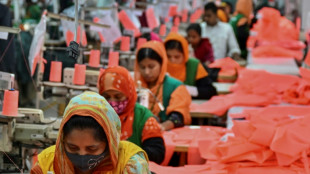
-
 PSG win 13th French title ahead of Aston Villa Champions League clash
PSG win 13th French title ahead of Aston Villa Champions League clash
-
Nick Rockett storms to victory in the 'Mullins' Grand National

-
 Despair and sadness follow death of Malian musical great Amadou
Despair and sadness follow death of Malian musical great Amadou
-
Arsenal held by Everton, Wolves push Ipswich closer to relegation

-
 Lions contender Prendergast fires Leinster to Champions Cup quarters
Lions contender Prendergast fires Leinster to Champions Cup quarters
-
Nick Rockett wins the 'Mullins' Grand National for father and son

-
 Last-gasp Buendia goal keeps Leverkusen's Bundesliga title hopes alive
Last-gasp Buendia goal keeps Leverkusen's Bundesliga title hopes alive
-
Video shows last minutes before Gaza aid workers' deaths, Red Crescent says
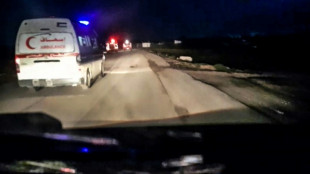
-
 Zverev 'mentally' affected by Australian Open defeat
Zverev 'mentally' affected by Australian Open defeat
-
Rahul guides Delhi to third straight IPL victory

-
 Arsenal draw at Everton to edge Liverpool closer to Premier League title
Arsenal draw at Everton to edge Liverpool closer to Premier League title
-
Senate Republicans move forward with Trump tax cuts

-
 Sinner regrets 'unfair' doping ban as he prepares return to courts
Sinner regrets 'unfair' doping ban as he prepares return to courts
-
Isa hat-trick powers Toulon into Champions Cup quarters in Saracens thriller

-
 'Hang tough, it won't be easy': Trump defiant on tariffs
'Hang tough, it won't be easy': Trump defiant on tariffs
-
Zelensky slams 'weak' US reply to Russian strike on his hometown
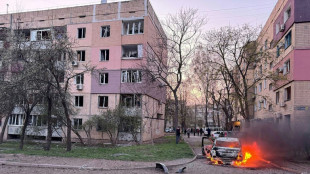
-
 Musiala hamstring tear compounds Bayern's injury crisis
Musiala hamstring tear compounds Bayern's injury crisis
-
Selfies, goals and cheers at South Africa's grannies World Cup

-
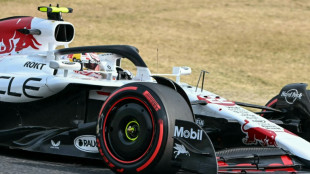 Tsunoda frustrated with 15th in Red Bull qualifying debut
Tsunoda frustrated with 15th in Red Bull qualifying debut
-
Rain forecast adds new element to combustible Japanese GP
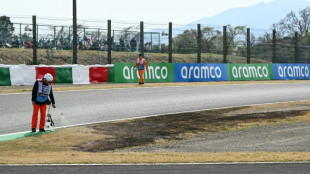
-
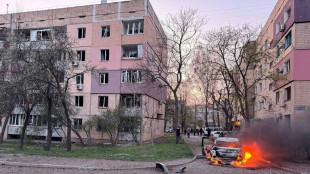 Ukraine mourns 18 killed in Russian missile strike
Ukraine mourns 18 killed in Russian missile strike
-
Germany's Mueller to leave Bayern Munich after 25 years

| RBGPF | 100% | 69.02 | $ | |
| BCE | 0.22% | 22.71 | $ | |
| BCC | 0.85% | 95.44 | $ | |
| GSK | -6.79% | 36.53 | $ | |
| NGG | -5.25% | 65.93 | $ | |
| CMSC | 0.13% | 22.29 | $ | |
| CMSD | 0.7% | 22.83 | $ | |
| AZN | -7.98% | 68.46 | $ | |
| RELX | -6.81% | 48.16 | $ | |
| RIO | -6.88% | 54.67 | $ | |
| JRI | -7.19% | 11.96 | $ | |
| VOD | -10.24% | 8.5 | $ | |
| RYCEF | -18.79% | 8.25 | $ | |
| BTI | -5.17% | 39.86 | $ | |
| SCS | -0.56% | 10.68 | $ | |
| BP | -10.43% | 28.38 | $ |

Japan shifting back to nuclear to ditch coal, power AI
Glinting in the sun by the world's biggest nuclear plant, the Sea of Japan is calm now. But as the huge facility gears up to restart, Kashiwazaki-Kariwa has a new tsunami wall, just in case.
Japan pulled the plug on nuclear power after the 2011 Fukushima disaster, but with the G7's dirtiest energy mix, it is seeking to cut emissions, and atomic energy is making a steady comeback, in part because of AI.
At the 400-hectare (1,000-acre) KK plant, shown to AFP in an exclusive tourthe 15-metre (50-foot) wall is just one measure to prevent another catastrophe and reassure the public and Japan's jittery neighbours.
"We believe that (a similar accident to Fukushima) could be largely avoided," Masaki Daito, KK deputy superintendent, told AFP. Japan now has "the strictest (regulatory) standards in the world".
The facility in central Japan -- like the nation as a whole -- is no stranger to earthquakes, having been shut down for two years for "upgrades" after a big jolt in 2007.
At Fukushima, a 15-metre tsunami cut power lines and flooded backup generators, disabling water pumps needed to keep nuclear fuel cool.
In this century's worst nuclear accident, three reactors went into meltdown and hydrogen explosions blew off roofs and released radioactivity into the air.
To keep the power running in the event of a quake, KK has new backup power supply vehicles on higher ground, plus "blow-out" panels and a new vent meant to filter out 99.9 percent of any radioactive particles.
In addition to the recently built sea wall, an embankment has been enlarged and reinforced. In corridors deep inside the reactor building, luminous stickers mark pipes and faucets.
"The lights all went out at Fukushima and no one could see," Daito said.
- Climate goals -
Before the 2011 quake and tsunami, which killed around 18,000 people, nuclear power generated about a third of Japan's electricity, with fossil fuels contributing most of the rest.
All of Japan's 54 reactors were shut down afterwards, including those at KK. To keep the lights on, resource-poor Japan has hiked imports of natural gas, coal and oil while increasing solar power.
But fossil fuels are expensive, with imports last year costing Japan about $510 million a day.
It is also not helping Japan achieve its climate pledges.
The E3G think-tank ranks Japan in last place -- by some distance -- among G7 nations on decarbonising their power systems.
Britain recently closed its last coal power station. Italy, France and Germany plan to follow suit. Japan and the United States, however, have no such target.
The government is striving for "carbon neutrality" by 2050 and to cut emissions by 46 percent by 2030 from 2013 levels.
It wants to increase the share of renewables to 36-38 percent from around 20 percent and cut fossil fuels to 41 percent from around two-thirds now.
Hanna Hakko, a Japan-based energy expert at E3G, thinks Japan could aim higher and have renewables generate 70-80 percent of its power by 2035.
"This would allow Japan to phase out coal, as it has committed to doing together with its G7 peers," Hakko told AFP.
- Nuclear resurgence -
Yet even under this scenario, the remainder would need to be covered by gas and nuclear energy.
Under its current plan, Japan aims for nuclear power to account for 20-22 percent of its electricity by 2030, up from well under 10 percent now.
Japan in late 2022 decided to accelerate reactor restarts and to extend operating time for nuclear reactors to 60 years from 40.
Nine of Japan's 33 still-operable reactors are currently online. At KK, unit seven is ready to join them once the local governor approves, with others set to follow.
Because of tougher safety rules since Fukushima, getting approval is a slow process. One restart was recently blocked because of earthquake risk.
Business groups remain worried about power shortages, particularly as Japan seeks to go big in energy-hungry data centres for artificial intelligence (AI).
"Japan has large untapped potential for renewable energy development," new Prime Minister Shigeru Ishiba told local media last week ahead of elections on October 27.
But he added: "Obviously, nuclear energy needs to be utilised."
- Megaquake -
The meltdown at Fukushima still looms large for people in Japan and elsewhere.
Japan is hit by hundreds of earthquakes per year -- mostly minor -- and in August, it issued a first "megaquake advisory" for its Pacific coast.
The alert was lifted after a week, but the government still sees a roughly 70 percent chance of a monster tremor within 30 years.
Making Fukushima fully safe, meanwhile, has also barely begun.
Japan last year started to release into the Pacific Ocean some of the 540 Olympic pools' worth of treated cooling water amassed since 2011. China banned Japanese seafood imports in response.
Engineers still have not worked out what to do with 800 tons of highly radioactive fuel and rubble. Humans still cannot enter the wrecked facility.
Mototsugu Oki, picnicking with his family at the beach by KK, said that like many Japanese, the Fukushima accident turned him off nuclear power for good.
"It is operated by human beings, and human beings naturally make mistakes," he told AFP.
S.F.Warren--AMWN
